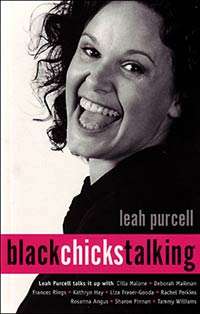Black Chicks Talking
 | |
| Author | Leah Purcell |
|---|---|
| Publisher | Hodder Headline Australia |
Publication date | 2002 |
| Pages | 363 |
| ISBN | 0-7336-1070-6 |
| Black Chicks Talking | |
|---|---|
| Directed by |
Brendan Fletcher Leah Purcell |
| Produced by |
Brendan Fletcher Bain Stewart |
| Cinematography | Himman Dhamija |
| Edited by | Reva Childs |
Production company |
Bungabura Productions |
Release dates | 2001 |
Running time | 52 minutes |
| Country | Australia |
| Language | English |
Black Chicks Talking is an arts project by Australian actress Leah Purcell featuring a 2001 documentary film, a 2002 book, a stage production and an art exhibition. The film is co-directed by Brendan Fletcher and features Indigenous Australian women including Purcell, actress Deborah Mailman and politician Kathryn Hay. Following the book and film, Purcell wrote a fictionalised dramatisation under the same title.[1]
Book
Purcell got the idea for a book featuring interviews of Indigenous Australian women following the success of her semi-autobiographical play Box the Pony.[2] After seeing the play someone suggested that Purcell find other Indigenous women to tell their stories.[2] Purcell sought out nine women who personally inspired her, some professional, some not.[2] The interviewees included politician and former Miss Australia Kathryn Hay, actress Deborah Mailman, netball player Sharon Finnan, United Nations youth delegate Tammy Williams, Rosanna Angus and Cilla Malone.[1][3] To initiate discussion, Purcell asked each woman the question "Out of the five senses, which one do you relate to and what is your first pleasurable memory of that sense?"[2] Her partner Bain Stewart gave her the idea of filming the interviews and using them as the basis for a documentary.[2] Further interviews were conducted over the telephone, particularly when participants felt uncomfortable opening up on-camera.[1] The interviews explored the topics of identity, family and culture in relation to Indigenous Australian women.[4]
Film
Purcell used the documentary footage of the interviews as the basis for the film. Only five of the women from the book are featured in the film — Hay, Mailman, Williams, Angus and Malone.[5] In addition to the solo interviews conducted for the book, Purcell filmed the women talking over dinner at a restaurant in Sydney.[3] The documentary was finished before the book was published.[2]
Release and reception
The film premiered at the inaugural Tribeca Film Festival[6] and was shown at the Melbourne and Sydney film festivals.[3][7] It was screened on the Australian network SBS on 30 August 2002.[2] It won the Inside Film Award for Best Documentary.[8] The book was published in June 2002 by Hodder Headline Australia.[7] Realist artist Robert Hannaford painted portraits of each of the nine women which, along with stills from the documentary, made up a travelling art exhibition.[7] A stage adaptation of Black Chicks Talking by Purcell and Sean Mee opened in December 2002.[4] The play is a fictional story with five female characters, one of whom, Elizabeth, is played by Purcell.[9]
References
- 1 2 3 Griffin, Michelle (30 June 2002), "Black chick talking", The Age, retrieved 20 January 2010
- 1 2 3 4 5 6 7 Capp, Rose; Villella, Fiona A. (September 2002), "Interview with Leah Purcell", Senses of Cinema, retrieved 21 January 2010
- 1 2 3 Webb, Carolyn (30 July 2002), "What does being black mean, anyway?", The Age, retrieved 19 January 2010
- 1 2 Kermond, Clare (29 August 2002), "Women's business", The Age, retrieved 22 January 2010
- ↑ Collins, Felicity; Davis, Therese (2004). "Backtracking after Mabo". Australian cinema after Mabo. Cambridge University Press. pp. 17–19. ISBN 0-521-54256-1.
- ↑ Turner, Tonya (11 April 2008), "There's power in the past", The Courier-Mail, retrieved 19 January 2010
- 1 2 3 Jopson, Debra (15 June 2002), "Aboriginal chicks decide to let the nation eavesdrop", The Age, retrieved 22 January 2010
- ↑ "IF Award Winners". Inside Film Awards. Retrieved 19 January 2010.
- ↑ Dunne, Stephen (18 January 2003), "Black Chicks Talking, Drama Theatre", The Sydney Morning Herald, retrieved 22 January 2010